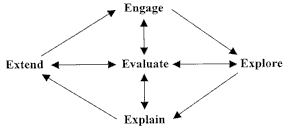Engage: In most
instances you will want to begin with Engage. In this stage you want to create
interest and generate curiosity in the topic of study; raise questions and elicit
responses from the students that will give you an idea of what they already know. This is
also a good opportunity for t you to identify misconceptions in students' understanding.
During this stage students should be asking questions (Why did this happen? How can I find
out?) Examples of engaging activities include the use of children's literature and
discrepant events.
Explore: During
the Explore stage students should be given opportunities to work together without direct
instruction from the teacher. You should act as a facilitator helping students to frame
questions by asking questions and observing. Using Piaget's theory , this is the time for
disequilibrium. Students should be puzzled. This is the opportunity for students to test
predictions and hypotheses and/or form new ones, try alternatives and discuss them
with peers, record observations and ideas and suspend judgement.
Explain: During
Explain, you should encourage students to explain concepts in their own words, ask for
evidence and clarification of their explanation, listen critically to one another's
explanation and those of the teacher. Students should use observations and recordings in
their explanations. At this stage you should provide definitions and explanations using
students' previous experiences as a basis for this discussion.
Elaborate:
During Elaborate students should apply concepts and skills in new (but similar) situations
and use formal labels and definitions. Remind students of alternative explanations and to
consider existing data and evidence as they explore new situations. Explore strategies
apply here as well because students should be using the previous information to ask
questions, propose solutions, make decisions, experiment, and record observations.
Evaluate:
Evaluation should take place throughout the learning experience. You should observe
students' knowledge and/or skills, application of new concepts and a change in thinking.
Students should assess their own learning. Ask open-ended questions and look for answers
that use observation, evidence, and previously accepted explanations. Ask questions that
would encourage future investigations.

